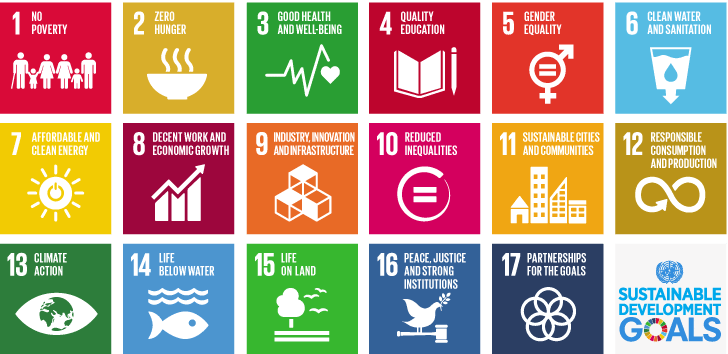How Can Businesses Contribute to the UN Sustainable Development Goals?
Back in 2015, the United Nations (UN) set 17 Sustainable Development Goals (SDGs) to address inequalities and challenges faced by communities all around the world; all while aiding development and protecting the environment. Procurri, which operates as a certified carbon-neutral organization, contributes toward a range of carbon offset projects that are carefully aligned with the SDGs and our products and services also work to their benefit.
But can any business say they’re contributing toward the goals and where should they start if they want to? Let’s investigate…
What are the UN Sustainable Development Goals?
The UN’s Sustainable Development Goals are a collection of seventeen interlinked objectives designed to serve as a “shared blueprint for peace and prosperity for people and the planet, now and into the future”.

Each SDG has a set title and a list of 8-12 targets within it; each with 1-4 indicators of progress, either aimed at achieving specific outcomes or initiative implementation.
While each is considerably more detailed than the title it’s commonly referred to, the goals, broadly speaking, are:
- Removing poverty
- Removing hunger
- Promoting good health and well-being
- Broadening access to quality education
- Achieving gender equality
- Broadening access to clean water and sanitation
- Broadening access to affordable and clean energy
- Broadening access to decent work and economic growth
- Encouraging innovation through industry and infrastructure
- Reducing inequality socially
- Building sustainable cities and communities
- Promoting responsible consumption and production
- Taking tangible climate action spanning above-land and below-water ecosystems
- Promoting peace, justice, and strong institutions
- Encouraging collaboration between all to accomplish the goals and the greater good.
Who can contribute toward the UN Sustainable Development Goals?
Absolutely any business of any shape, size, or type can contribute toward the UN SDGs. The SDGs are not legally binding and so there’s no specific commitment or requirement needed in order to contribute positively.
While large businesses who work alongside UN custodian agencies, government policymakers, NGOs, and relevant research institutions may be asked to take part in formal reporting in order to feedback on progress on contributions, there is no formal monitoring procedures to take part in. Instead, it’s recommended that businesses include such reporting on their progress to relevant stakeholders through their standard corporate reporting. Already some 40% of the world’s largest companies reference the UN SDGs in their annual reporting!
How can IT businesses contribute toward the UN Sustainable Development Goals?
Those in the IT industry can, directly and indirectly, contribute toward many of the UN SDGs. There are no limits to how many of the goals that businesses can choose to work toward, and so anything relevant may be achievable. However, the following SDGs are the most commonly incorporated in IT practices:
#7 Affordable and Clean Energy
The investment into cleaner energy sources for both office-based operations and IT hardware maintenance can prove a tangible contribution toward SDG #7 for IT businesses of all types. This may include the reduction of energy usage as well as moving toward renewable energy sources.
#9 Industry, Innovation, and Infrastructure
Offering innovative products or services in the IT sphere in terms of sustainability can be considered work toward SDG #9, as can collaborating with or purchasing products and services from sustainability-focused businesses. For example, using Procurri products or services proves buy-in to industry innovation.
#12 Responsible Consumption and Production
All businesses rely on others and for most, there is room for improvement throughout their supply chain. In Procurri’s case, the sale of our products and services encourages responsible consumption and the lessening of overconsumption and overproduction, but most businesses find that amending their own practices helps contribute toward SDG #12.
#13 Climate Action
If a business can receive an environmental or sustainability credential, their commitment to taking positive climate action sits in line with SDG #13. For Procurri, this is achieved through the ongoing accolade of our Carbon Footprint Standard accreditation as a Carbon Neutral Operating Organization.
The rest of the SDGs can also be worked toward by IT companies, indirectly if not directly. The purchase of carbon credits toward carbon offset programs may contribute toward many other areas and the investment into such initiatives allows businesses to choose and shift their focus over time. The influence of businesses who are experts in their field on industry and policymaking change may also contribute to and feed into the development of other goals. There may also be SDGs that aren’t necessarily business-related that can be worked toward through internal staff efforts; such as the allowance of staff to deliver quality education and training for free to those who wouldn’t otherwise be able to access it (externally to the business), volunteering trips or leave to work on passion projects, and the publishing of gender pay gap policies and reviews.
Where can IT businesses seek advice and guidance on how to contribute to the UN Sustainable Development Goals?
If you’re unsure of where to start – or even if you’re already taking relevant action that could be considered SDG contributions – the Procurri team can help you assert what action to take and how. Whether it’s reducing business consumption through the extension of hardware lifecycles, the management of tangible climate action through ethical and environmentally-friendly ITAD practices, or the promotion of better buying behavior through asset resale and remarketing, we’ve got you covered!



